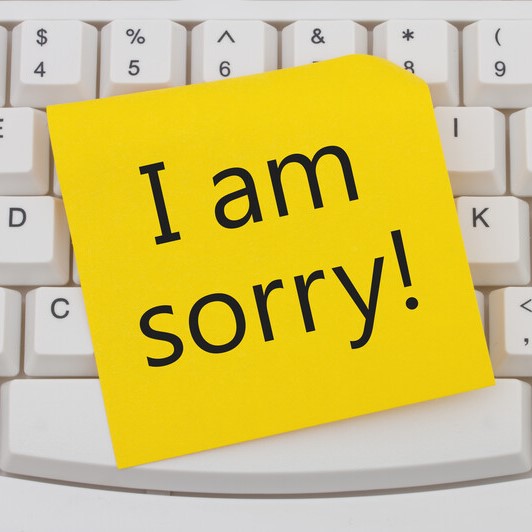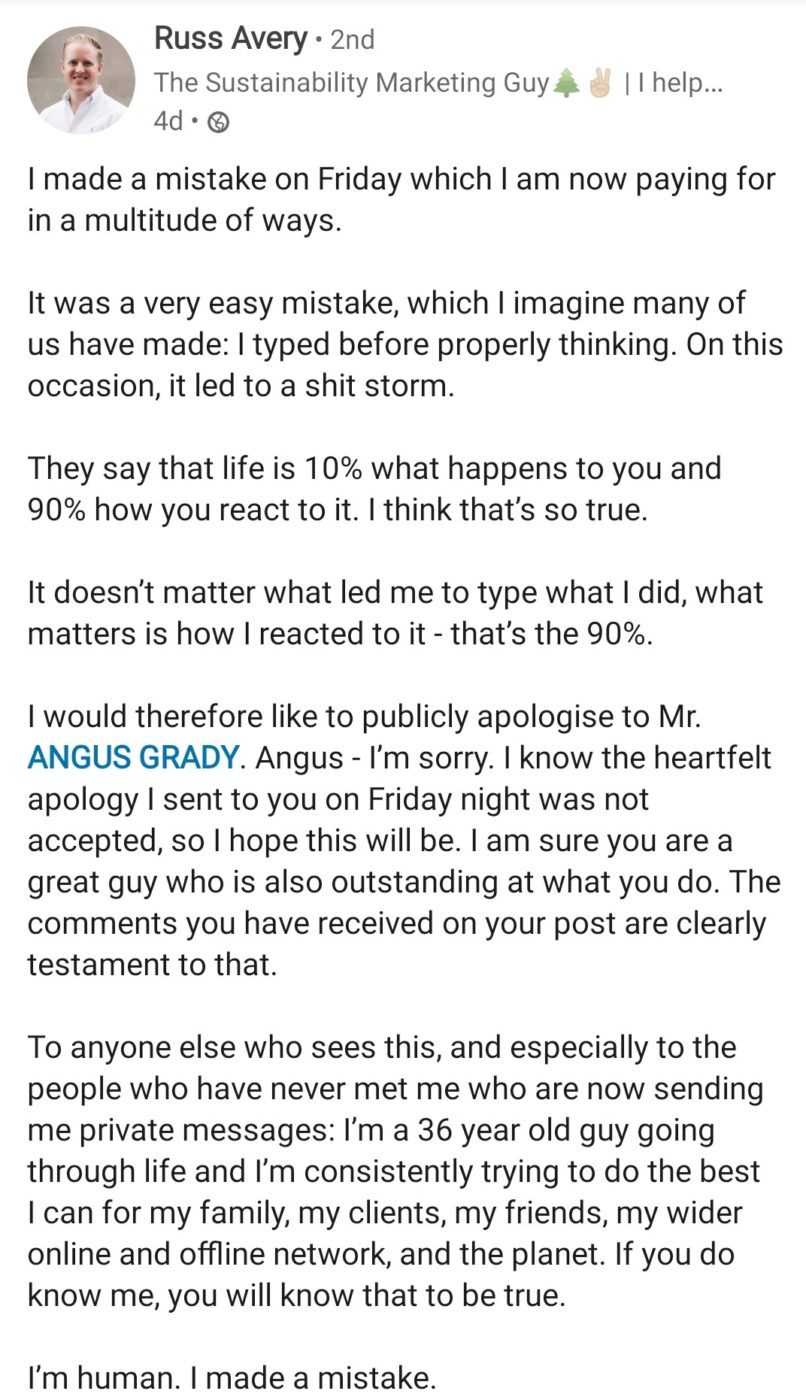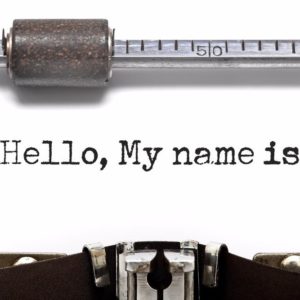

Making A Public Apology – Yes? or No?
Do you ever read something, form an opinion but then your brain applies the brakes and says, ‘Hmmm – hold on a minute. I wonder if that’s really what I think.’
Usually, in those situations, I’m pretty good at coming up with a host of alternative perspectives, then deciding whether to stick to my original opinion or adapt it. But occasionally I get tunnel vision and have to ask others to point out the alternatives.
So I’d like to enlist your help please
Browsing LinkedIn one day I came across a post that was unlike anything I’d ever read on the site. After reading it, I formed a very strong opinion of the person who wrote it – and have yet to come up with any alternative perspectives.
At this point, I’m not going to tell you what that opinion is. Instead, I’m going to get you to read the post and see what opinion you form.

So what’s your opinion? Positive or negative?
Mine was strongly positive. Why? Because even though Russ did something wrong (and we’re not given the specifics of that) he was willing to take responsibility for it and brave enough to do that publicly. That’s what’s speaking volumes to me about his personal brand and swaying my opinion.
What’s added to that is his point that: ‘It was a very easy mistake, which I imagine many of us has made.’ Because I’m prone to the odd gaff now and then, but the thought of making it in front of a huge audience (such as on LinkedIn) is one of my worst nightmares. Therefore, the fact he’s in that situation also pushes my sympathy button.
Another point of view
So, that’s what I think, but I genuinely would be interested in your view, because my tunnel vision has appeared and I’m struggling to see the alternative perspective (and I know there will be one) where what he’s done creates a negative impression.
At the very least, if you do ever find yourself in Russ’s position (and I sincerely hope you don’t) you have an idea of how you could possibly handle it to preserve your personal brand.
What do you think? Do you agree that Russ, despite having done something negative, has created a positive impression with how he’s dealt with that? Or did you have a different reaction to reading the post – and if so, why? There’s a comment box below that I’d really welcome your views in. Thank you.







I felt the response was a little overwrought and almost patronising. The apology could have been more concise without the message being subverted. Wisdom of hindsight is wonderful until you realise that’s all it is so I would have been more economical with my words.
His public statement feels a little like the ‘wronged’ status is shifting from the person he’s apologising to, and onto himself. He’s casting the person he upset as the bad guy here for not accepting his apology – which feels quite passive aggressive. It comes across as a bit defensive and entitled – ‘I’ve apologised, what more do you want?’
I think no completely unnecessary, can people not make mistakes anymore without having to justify themselves to the World. He apologised privately, it wasn’t accepted he needs to learn from his mistake & move on. It makes me very uncomfortable the stage I feel like we’re moving into as a society, i.e. cancel culture people are afraid to make a mistake or voice an opinion as it appears it can have a detrimental effect on their career if not well received. The post feels like self flagellation, it’s unnecessary & not particularly professional.
I do not understand why he turned a private matter into a public one, and why he should seek personal publicity by making it so. What goes through my head is what had he done that was so bad that an apology was not enough to address it? Similarly, I do not believe that he should have named the other party involved, since that straight away draws them into defending their actions. Overall, I see nothing good coming from it.
If I have made a mistake (a minor but easily reversed clanger on Saturday comes to mind), then I apologise to those I may have affected, tell them what I am doing to put it right, and then get on with it. No need to tell the uninvolved.
I agree with Tony that it seems unfair to name the other party involved. I don’t doubt that Russ is very sorry and he is definitely brave and humble to share his mistake so openly. However it feels like a lot of the motivation of the post is driven by Russ trying to make himself feel better by prodding Tony into accepting his apology.
To me it would have looked more authentic and genuine if he had not mentioned the other person.
That said, the sentence about people who never met him sending private messages suggests that his mistake must have been very public.
See – that’s why I wanted your opinions. You’ve all really given me some perspectives I hadn’t seen and they’re certainly tempering my view. I especially think the bit about not naming the person who’d been wronged was a better way to go. Thanks and keep your thoughts coming!
I agree with the points that both Tony and Jeff have made. Here’s my take on it:
– he messed up and apologised privately – good attempt at recovery, and admitting the mistake.
– he didn’t get the answer/response he was looking for – for me this is the crucial part.
– posting it publicly – good for self awareness, but he didn’t need to bring the other person into the mix. And this is where my cynical head comes into play. Was the public post purely for self-awareness, or was it highlighting to the tagged person ‘look these people would have accepted my apology, why can’t you?’ – ‘look how self-aware/fantastic I am to have admitted my mistake and publicly admitted it!’
– the wording of the public ‘apology’ also irks me a bit – ‘I’m sure you are a great guy who is also outstanding at what he does.’ – ‘I know the heartfelt apology was not accepted.’ The passive aggressive-ness, the ‘I’m also outstanding’ belief makes me think the post is more self-serving than anything else.
If I was Mr Grady, this would not help the situation, and I would be even less likely to accept either apology.
Obviously with the benefit of hindsight, while I might have publicly admitted my mistake on LinkedIn, I wouldn’t have tagged in the other person. I would have reflected on how to make sure I didn’t make the same mistake again, talked through the measures I’d put in place and then also ask others for their input/advice and suggestions.
I also really want to know what happened!
We seem to be living in a world in which things are made OK by the issuance of a public apology; a belief that a public apology somehow rights the wrong and resets the status quo. It does not work like that. If I make a mistake that hurts others I should apologise directly to them and accept that they may still feel hurt. I should also learn from that mistake by ensuring I do not repeat it, then move on.
Russ is wrong to take his apology into the public arena. What is the point of doing so? Is he trying to convince everyone who knows him, or perhaps himself, that he is still a wonderful human being?
Here’s a question though: have I done unto Russ just as he did unto others by sharing his post here and inviting comments? Hmmmm, this is all getting a bit philosophical!
I am with you on this one Jennifer. It takes a real person to not only so publicly admit they acted inappropriately but to make the public apology as well.
I am often stunned by the comments others make online and I wonder if they would make the same comments if the person was sat across from them.
Hat’s off to Russ, I don’t know the man, but I certainly respect him. I don’t think anybody can take anything negative from Russ’s response.
Thanks Elspeth. I’ve enjoyed getting others’ perspectives but it’s nice to know I’m not totally alone in thinking there was a positive response!
I’m a great believer in trying to make a good situation out of a bad one. 100% of us make mistakes. It’s how we react to those mistakes that make us what we are.
That sounds very zen Jim 🙂